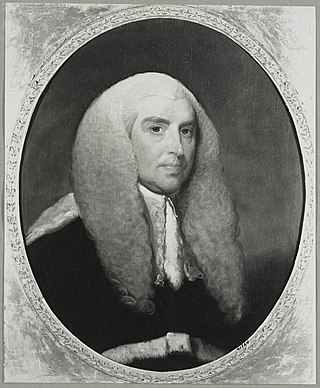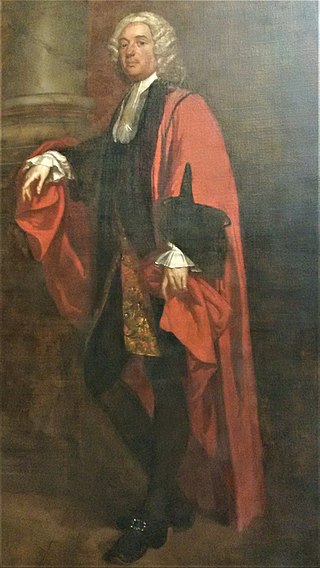Related Research Articles

Hugh Carleton MRIA, 1st Viscount Carleton, PC (I), SL was an Irish politician and judge.
Louis Perrin was an Irish barrister, politician and judge.
James Dennis, 1st Baron Tracton PC was an Irish politician and judge.
Sir Edmond Stanley SL (1760–1843) was an Anglo-Irish lawyer and politician who served as Serjeant-at-Law of the Parliament of Ireland, Recorder of Prince of Wales Island, now Penang, and subsequently Chief Justice of Madras. The elopement of his teenage daughter Mary Anne in 1815 caused a notable scandal. His career was hampered by his enormous debts, as a result of which he was forced to resign his Irish office.
This is a list of lawyers who held the rank of serjeant-at-law at the Bar of Ireland.

Philip Tisdall SL was an Irish lawyer and politician, who held the office of Attorney-General for Ireland. He was for many years a leading figure in the Irish Government.
Sir Nathaniel Catelyn, was a leading English-born politician and judge in seventeenth-century Ireland. He was Speaker of the Irish House of Commons in the Irish Parliament of 1634–5, Recorder of Dublin and the first holder of the office of Second Serjeant. Despite accusations of conflict of interest and of Roman Catholic sympathies, he retained the confidence of the Crown and was a key ally of Thomas Wentworth, 1st Earl of Strafford, the Lord Deputy of Ireland.
Sir John Meade, 1st Baronet (1642–1707) was an Irish barrister, judge and politician. He was the first of the Meade Baronets of Balintubber, and an ancestor of the Earls of Clanwilliam. He was unusual among the lawyers of his time for his lack of ambition to become a judge of the High Court, despite being generally regarded as a barrister of "excellent parts (qualities)". In matters of religion, he seems to have been, by the standards of his time, a man of very tolerant views: although he was himself a Protestant, he damaged his career by marrying Elizabeth Butler, who was a Roman Catholic, as his third wife.

Sir Thomas Pakenham (1649-1703) was an Irish barrister and politician: he sat in the Irish House of Commons as MP for Augher and held the office of Serjeant-at-law (Ireland). He was the grandfather of the first Baron Longford.

Sir James Chatterton, 1st Baronet, was an Irish lawyer and politician, and the first of the Chatterton Baronets of Castle Mahon.
Attiwell Wood (1728-1784) was an Irish politician, barrister and Law Officer of the eighteenth century.

Eaton Stannard (1685–1755) was a leading politician and lawyer in 18th-century Ireland. He was a popular Recorder of Dublin, a very unpopular serjeant-at-law (Ireland), and an experienced parliamentarian who represented Midleton in the Irish House of Commons for many years. He is mainly remembered now as a close friend of Jonathan Swift, whose last known letter was written to him.

Henry Purdon was an Irish barrister, politician and Law Officer of the early eighteenth century. He sat in the Irish House of Commons and held the Crown office of Third Serjeant.
Maurice Coppinger was an Irish barrister and politician, who sat in the Irish House of Commons for many years, and held the office of King's Serjeant. His name is commemorated in Coppinger Row, a side street in central Dublin city; his townhouse was on South William Street nearby.
Richard Benson Warren (1784-1848) was an Irish barrister and Law Officer who held the position of Serjeant-at-law (Ireland).

Richard Bettesworth (1689-1741) was an Irish politician, Law Officer and barrister of the early eighteenth century. He was a quarrelsome individual, and his list of enemies included Jonathan Swift, the publisher George Faulkner and Josiah Hort, Bishop of Kilmore and future Archbishop of Tuam.
Robert Dixon (1685-1732) was an Irish barrister, judge and politician who served very briefly as a justice of the Court of Common Pleas (Ireland).
John Cliffe (1661–1728) was an Irish barrister, landowner and politician. He sat in the Irish House of Commons for many years, where he was often called on to speak for the Government, and held the office of Serjeant-at-law (Ireland).
Richard Malone (1706–1759) was an Irish barrister and politician. He held the office of Serjeant-at-law and sat for many years in the Irish House of Commons as member for Fore.
Edmund Malone (1704–1774) was an Irish barrister, politician and judge. He was the second of three brothers who all rose to the top of the legal profession, as their father had before them. He was the father of the first and only Lord Sunderlin, and of Edmund Malone junior, the noted Shakespearean scholar.
References
- Agnew, David Carnegie Andrew Protestant Exiles from France, chiefly in the reign of Louis XIV; or The Huguenot Refugees and their descendants in Great Britain and Ireland Edinburgh Turnbull and Spears 1886
- Burke, Oliver Anecdotes of the Connaught Circuit Dublin Hodges Figgis 1885
- Cork City and County Archives-List of Freemen of City of Cork 1710-1841
- Gentleman's Magazine 1789
- Hart, A. R. History of the King's Serjeant at law in Ireland Dublin Four Courts Press 2000
- Hibernian Magazine 1774
- Richie, Rosemary "Henry Duquerry" Cambridge Dictionary of Irish Biography